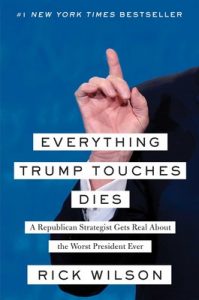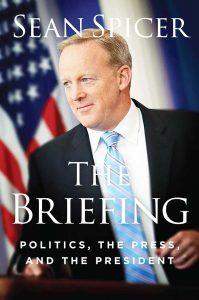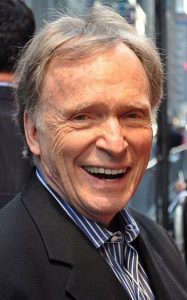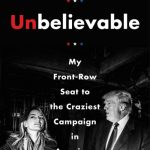Today on The Drive, Steve Jaxon spoke with Steve Schmidt, one of the leaders of The Lincoln Project. Here is the complete interview.
 Vicario Productions
Vicario Productions
Today on The Drive, Steve Jaxon spoke with Steve Schmidt, one of the leaders of The Lincoln Project. Here is the complete interview.
Brew Ha Ha is one of two Vicario Productions shows that are podcast, in addition to their live radio versions. The podcast of Brew Ha Ha has its own website, where each episode has a page of its own, with show notes and pictures, as well as an audio player for that episode.
The audio player for each episode of the podcast can be copied from that page and embedded into any other web page. We encourage our guests to embed their podcast episodes on a page somewhere on their own website. Here is an example of an embedded podcast player:
Episode: Ramon Tamayo from Anchor Brewing, Oct. 25, 2018.
Note that the embedded audio player does not contain the episode name, so I have added that in bold letters above the player. When you copy the code into your web page, be sure that you are viewing your page in the “text view” or “code view” mode and not in any visual editor, which may not take the code correctly.
California Wine Country is one of two Vicario Productions shows that are podcast, in addition to their live radio versions. The podcast of California Wine Country has its own website here, where each episode has a page of its own, with show notes and pictures, as well as an audio player for that episode.
The audio player for each episode of the podcast can be copied from that page and embedded into any other web page. We encourage our guests to embed their podcast episodes on a page somewhere on their own website. Here is an example of an embedded podcast player:
Episode: Balletto Vineyards, Jan. 31, 2018.
Note that the embedded audio player does not contain the episode name, so I have added that in bold letters above the player. When you copy the code into your web page, be sure that you are viewing your page in the “text view” or “code view” mode and not in any visual editor, which may not take the code correctly.
Jon Miller spoke to Steve Jaxon on The Drive today. Jon Miller is the longtime broadcast voice of the San Francisco Giants and baseball on ESPN, and a member of the Baseball Hall of Fame.
Rick Wilson is in the studio today on The Drive, for an interview about his new book called Everything Trump Touches Dies.
Here is the complete conversation (41:48) between Steve Jaxon and Rick Wilson.

Sean Spicer, former White House Press Secretary, was on The Drive with Steve Jaxon today, to talk about his new book, The Briefing, which is about his time in the White House in the first few months of the current administration.

Lewis Black came on to The Drive with Steve Jaxon yesterday, since he is being honored on Sunday, January 14, at the San Francisco Sketchfest, which will feature 230 different shows over three weeks.

Lewis Black
Lewis Black will be in a hosted conversation at the tribute, then he will record a live episode of “The Rant Is Due” which is a show he does on Audible.com. He invites audience members to write in questions, or deliver them at the show and it goes out live. He will also be performing in Monterey, Santa Barbara and then at Sketchfest, all live for The Rant is Due.
The Sketchfest Lewis Black tribute will take place on Sunday January 14, at the Marines’ Memorial Theater. Steve mentions that they are also doing a tribute to Jane Lynch, Ricky Gervais in conversation with Christopher Guest, and of course the Dick Cavett tribute.
He talks about a film he did last November called The Last Laugh, with Chevy Chase and Richard Dreyfus. Dreyfus plays a guy who left comedy to become a doctor, in order to please his wife, who then dies, then he goes back into comedy. Chevy Chase plays his manager and Lewis Black’s character’s ex-manager. It will come out some time in the Summer, he guesses.
He has a double album that came out recently, one is a special that was never released and another is a special that he did for Comedy Central, a Broadway show, just before the election. The material still works, because all the stuff he said still applies! He goes on to say that the President’s tweets aren’t news, they’re pathology.
“How do you satirize what’s already satiric? He’s a satire of himself! You can’t make this funnier for people! If you don’t know what the joke is, then something is wrong with you!
He wonders aloud how to do comedy in this day and age. “How do you satirize what’s already satiric? He’s a satire of himself! You can’t make this funnier for people! If you don’t know what the joke is, then something is wrong with you! I spent 40 years making jokes about him. I moved here to New York 40 years ago and within a week I was making jokes about him. And the last thing I thought he’d become was the President of the United States. Then I’ve got to pick up the New York Times and look at the front page and I’m supposed to take this seriously? To the point that it would drive people to say, “oh, I hope Oprah runs to be President? What level of madness! I can’t wait, that’s why I love coming out to San Francisco, you people are 20 years ahead of this nonsense. You guys are already over him. You act as if this has already happened?
Steve then asks Lewis Black about Jeff Sessions’ recently announced decision to prosecute marijuana cases again. “There’s a horse’s ass…. The state’s burning to the ground and you’re worried about pot? There’s a opioid crisis in the middle of the country…”
“Why did I bother to live? It’s everything I’m against! Everything that I’ve put my foot down on, has come back and put its foot down on me. (…) It’s like watching dinosaurs leave the earth. Now I’m going to have to go too! It’s not right! Maybe that’s why I have anxiety.” “Tyrannosaurus Black,” says Steve.
Lewis Black will be in conversation with Ed Wasserman, one of his oldest friends, who is the Dean of the UC Berkeley School of Journalism, and Lewis suggests his friend can explain to everyone what has happened to journalism.
In closing, Steve says, “Hey, we’ve got to talk more often,” and Lewis Black replies, “you give me a yell whenever you want, I’m available, I’ve got no life. (…) I’m serious, this really helped take the edge off.”

Dick Cavett (April 2010)
Dick Cavett joined Steve Jaxon on The Drive yesterday afternoon, and they talked about how Dick Cavett’s career got started and what he is doing these days.
There will be a 50th Anniversary Tribute to the Dick Cavett Show with John Hodgman, Lance Bangs and Dave Hill, as part of Sketchfest, at the Marines’ Memorial Theater in San Francisco, on Friday, January 12 at 7:30.
Dick Cavett describes how he left his home in Nebraska for Yale and then ended up in New York and his first show was a daytime show on ABC. Then he went to the evenings when Joey Bishop left the network, then to PBS, then he describes other stops, saying, “As soon as you get settled, they move you.”
Steve Jaxon mentions that Dick Cavett has interviewed Salvador Dalí, Groucho Marx, Katherine Hepburn, Judy Garland, Marlon Brandon, John Lennon and Yoko Ono, and for both of them, the experience of seeing Tom Hanks in Forrest Gump, superimposed onto the film of the Dick Cavett Show with John and Yoko, was amazing.
Steve asks Dick how he got started, and he remarks that from Nebraska he went to Yale, then in New York he wrote a monolog and handed it to Jack Parr who liked it and hired him. Dick says he was lucky, to start as a writer for Parr. He notes, however, that he began as a talent booker. “They didn’t have an opening on the writer’s staff, so I got to talk to guests and get to know them. That was great fun, but writing was more status and certainly more money.”
Steve asks, “You did start the ABC show first and then wound up at PBS. What would you consider the differences?”
Dick: “You had less hassle on PBS. I kind of enjoyed trouble and whenever you had it on ABC it ended up being entertaining. No commercial breaks on PBS, but essentially all television seems the same to me, my kind, at least, you just sit and talk to somebody until it’s time to go home.”
Steve: “I don’t know if I could do this show three hours a day for nine years without taking breaks. So what are you doing these days, besides being honored and stuff? I know you’ve written books, you do a lot of stuff.”
Dick: “I keep being in people’s documentaries. Every time I turn around somebody dies and they’ll do a documentary and it will be someone I had on my show. And also, I shouldn’t confess this, but every so often I watch myself on Decades. The Decades channel has been running some of my old shows five days a week. (Yeah, I’ve been watching some of that. ) And it’s a strange feeling to be sitting there with someone you knew decades ago, and they’re dead. So it gives you a different attitude in watching yourself talk to them than if you knew they were alive. A lot of them are dead. I guess chronologically that happens. I was sort of early thirties, and many of my guests were of course in their fifties and sixties and seventies even, and probably some eighties, so a lot of those get lopped off by father time.”
Steve: “I hope you can talk about this, I believe you’ve been quoted as saying it was the worst show of your life, of your career. It was John Cassavetes and Peter Falk. Dick: “They were all drunk. What an elegant friend of mine called “shifassed” They decided to be hilarious by falling down and pulling each other’s shoes off and smelling their feet. I really got sick of it. It was mostly disbelief. At one point I turned to the audience and said, “This is why I never joined a fraternity. The thing that really struck me, not as a joke, was that in those same chairs, one week earlier, were Alfred Luntz, Lynne Fontaine and Noel Coward. They were so embarrassed when they would run into me on the street. The worst part of it for them, was their director or PR man gave them a brutal tongue lashing, saying if anyone was going to buy tickets to that film, they won’t now.”
This Sketchfest tribute is celebrating the 50th anniversary of the Dick Cavett Show. “I’ll be telling stories, reminiscing and shock the audience with obscene tales from show business. Whatever we come up with is what they’re going to get.”
Steve: “You interviewed Spiro Agnew, and I’ve read it’s another of your least favorite interviews.” Dick: “It was the beginning of the campaign and he was new on the scene. We put up cartoons of him. Each one I referred to, he had nothing to say about it.”
Steve invites Dick Cavett back on the show, and Dick Cavett agrees he’ll come back on, and Steve says, “That’s a career highlight for the kid here.”
Photo of Dick Cavett in April 2010 by Nick Step, used with no changes by Creative Commons license, retrieved here: https://upload.wikimedia.org/wikipedia/commons/f/f3/DickCavettApr10.jpg creative commons license: https://creativecommons.org/licenses/by/2.0/

Richard Lewis
Comedian Richard Lewis joined Steve Jaxon on The Drive today. Here is the audio of his interview. He will be performing on December 2 and 3, at Cobb’s in San Francisco. He is currently on Curb Your Enthusiasm. To keep up with Richard Lewis, visit his Twitter page: https://twitter.com/therichardlewis
They begin by discussing the current news about famous men including comedy performers, being accused of sexual harassment, and Richard Lewis says that he tends to prefer to avoid those subjects on stage, in favor of entertaining his audience by telling jokes about himself.
He tells about knowing Larry David since they were born at the same time and place. They only learned about the birth coincidence recently. But they were athletic rivals in their early teens at summer camp. Then he became a comedian and Larry was hanging around the night club. They became fast friends then and have been ever since. He goes on to tell stories about working with him. Later he describes the time when he was recovering from a fall, he remembers having been friends with the greatest comedians of the century. He was impressed with how hard he worked and how much success he had so early, This has made him more relaxed as a performer, finally feeling good about himself.
 Katy Tur spoke with Steve Jaxon today about her new book, Unbelievable: My Front Row Seat to the Craziest Election in American History” which is on sale now. Katy Tur covered the Trump campaign for MSNBC in what was supposed to be a short-term assignment. We all know how that went.
Katy Tur spoke with Steve Jaxon today about her new book, Unbelievable: My Front Row Seat to the Craziest Election in American History” which is on sale now. Katy Tur covered the Trump campaign for MSNBC in what was supposed to be a short-term assignment. We all know how that went.
Steve introduces Katy Tur, who won the 2017 Walter Cronkite Award for Excellence in Journalism. He asks her to tell how she first got the assignment and she tells how she had just moved to London to cover international affairs, “everything but American politics.” She was in New York with the Make A Wish Foundation and she just happened to be in the newsroom one day when she was asked to cover the Trump campaign for what was supposed to be at the most a six week term.
Steve asked when she first thought that the campaign might not fizzle out as many people had predicted. She says that she noticed that he was getting so much attention early on, she started to wonder whether “Washington establishment knew what he was on to.
She had to ask herself if she could trust what she was seeing with her own eyes and it turned out not to be a fluke. This is despite the many outrageous things he would say. The most surreal email she has ever received in her entire life has to do with the emergence of the Access Hollywood tape. She tells of being brought into a room to see the tape and her bosses at NBC asked her to get a comment from the campaign. She repeated verbatim the quotes, in the email she wrote to the campaign. She never got a comment. But the candidate would single her out in front of crowds, whether he was happy with her reporting or not. This began when she was the only national reporter covering him. And he made her a part of the story, which is something that made her uncomfortable. Even when the Secret Service had to walk her to her car, she had to bear down and keep going. She did take a day or two to make sure she didn’t want to go to Washington and cover the president.
Steve asks her about “the meat press conference” when the candidate appeared with his steak products and other items. He dragged teh press corps around to his properties in a thinly-veiled attempt to attract attention to his steaks, water, wine, magazine, etc. This was just after Mitt Romney slammed Trump at an event in Utah, calling him a fraud and a fake. They weren’t even Trump steaks, those are no longer for sale. The Trump water is just water anyone can buy on line and have it labeled with any name. Even the magazine was syndicated content. The wine company says it is entirely owned by his son. So even if the reporters quickly debunked the entire press conference, he went on as if the reporters hadn’t already debunked them.